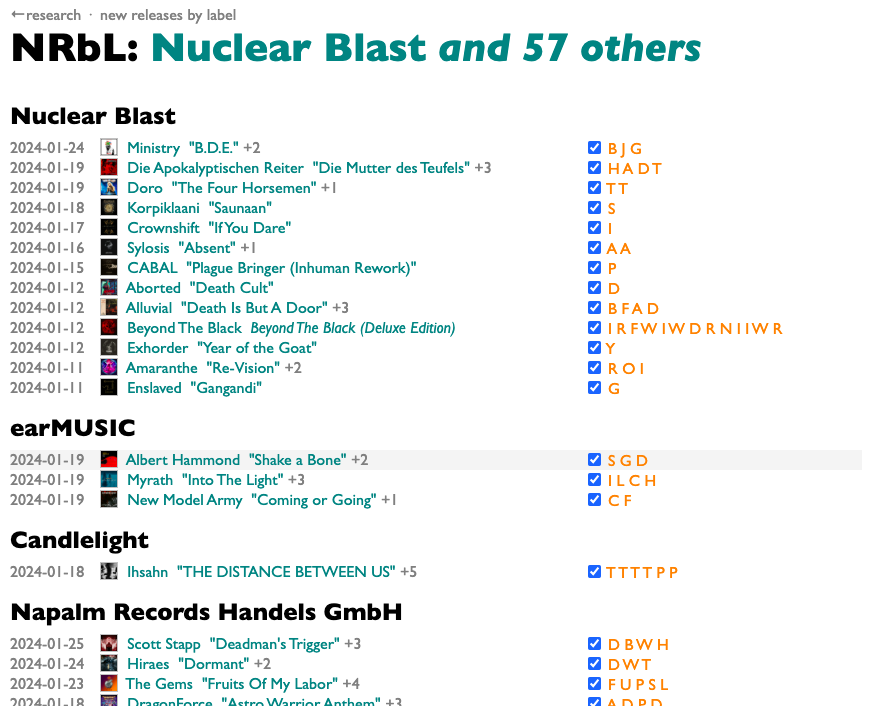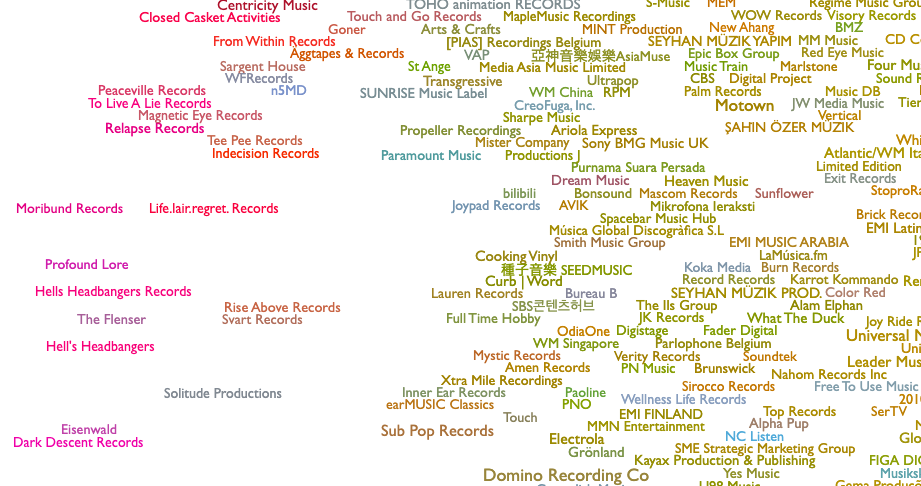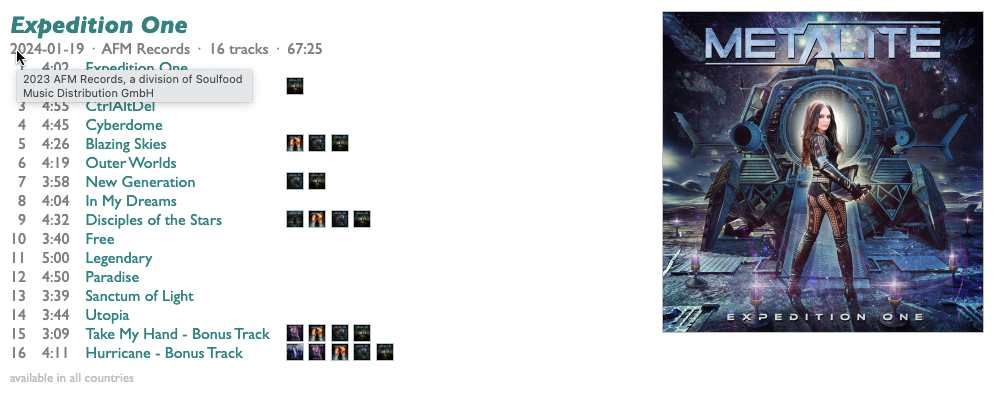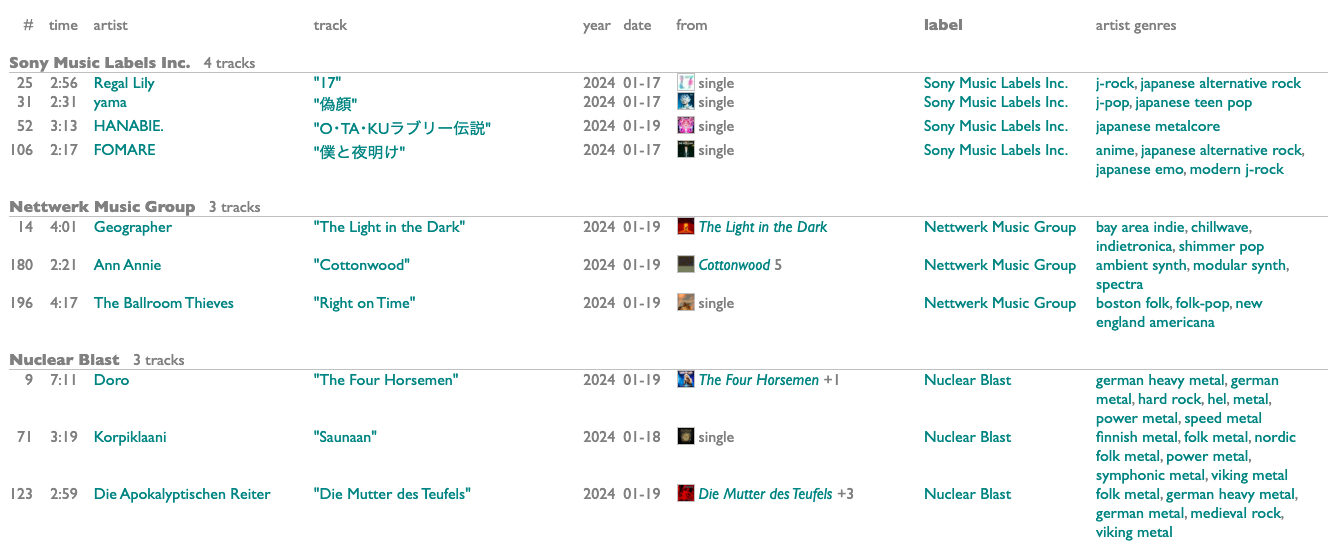¶ New Releases by...Something · 25 January 2024 listen/tech
Whatever my job is or, currently, isn't, I still really want to know about new music, and there were exactly two excellent methods for this and I made them both and I'm not allowed to use either one any more. So I keep poking at approaches to this problem using public tools, and the Spotify API is still the best of these. I've gone so far as to implement a version of the obviously-intractable brute-force approach of getting a genre's artists, expanding to all those artists' Fans Also Like artists (refcounting along the way), and then getting the catalog for each artist in the resulting longer list in order to filter their releases by release-date.
This does sort of work, eventually. It's not especially convincing for coverage, because the public API only exposes 20 Fans Also Like artists, where the internal Spotify datasource behind that (at least as long as they keep maintaining the similar-artist system I wrote) had up to 250 for each seed artist. And it takes just about forever, because it requires thousands of individual queries, and even with only one instance of it running my API key quickly hits its rate-limit and gets throttled to wait in between calls.
As I have noted, Spotify could mostly fix this problem by enabling genre: filtering in the /search API when searching for "albums" (which actually means releases despite my 10 years of trying to persuade a nominal music service to take the difference between singles and albums seriously), since this API already has a tag:new filter for getting new releases (from the last 2 weeks, which is also kind of arbitrary but at least means the last full release-week is always completely covered). There's already internal data for artists' "extended" genres, which is the extrapolated version using collective artist similarity. Or at least there is if they keep maintaining the genre system I wrote.
You can see exactly how viable this is, if you're curious and not unmanageably triggered by a thing that takes the shape of our loss without salving it, because the search API does already allow release searches to be filtered by label: the same way it could allow searching by genre. Any API app could do this, there's nothing special about my access or techniques here. But I looked and didn't find one, so I made it. This is what my job was like, too, and apparently I was literally correct when I used to say that I'd be doing it even if they weren't paying me.
Thus: New Releases by Label for, e.g., a list of 58 metal-related labels.

The chances are decent that if too many people try this at once it will slow down or die, too, but for each label it requires as few as two queries: one to get that label's new releases (in pages of 50 if a single label has more than 50 new releases from the last two weeks), and then at least one follow-up query (in pages of 20) to get those albums' tracks. This is reasonable overhead.
Labels are no direct substitute for genres, obviously, not least because if you care about music you need not also care about labels or whether artists are even on one.
And even if you do care about labels, label data is messy. It's something of a stretch to call it "label data", in the current music-distribution ecosystem. There's a text field for "label", and humans type stuff into it. If the humans doing a given bit of typing are diligent, and none of the other undiligent humans stray into the diligent namespaces by accident or nefarity, then you can kind of pretend it's data. I spent a while in my former job trying to do slightly better than this by aggressively normalizing name-variations and algorithmically distinguishing between actual labels and whatever words people who aren't on labels would type into that box, with some success:

I see there that my past-job self could have combined "Hell's Headbangers" and "Hells Headbangers Records" by removing apostrophes, which either didn't occur to me or caused more problems than it solved, and I no longer remember which and can't check.
There are, though, many labels that exist to release a certain kind of music according to some kind of unifying principle, and those principles tend to align with genres, or more accurately tend to be part of the social structure that builds music-based communities, which are what I usually mean when I talk about genres. So this approach is wildly incomplete, but seems at least potentially helpful to me. You can try it with some labels you like, and see if it helps you, too.
The one small catch with this is that the API label filter is very literal. You have to know the exact way the label you're looking for is typed in the "label" fields. And, inconveniently, that label field does not actually appear in the Spotify app.** What you see instead are the copyright and publishing credits, at the bottom of an album's tracklist like this:

You might guess that the "label" here could be either "AFM Records" or "Soulfood Music Distribution GmbH", and as it turns out "AFM Records" is right, but it didn't have to be either of those and guessing is tedious anyway.
But I have a thing for exercising my petty annoyances about how to display albums, already, so if you look up an artist in the everynoise research tools, you can now see each release's label next to its release date.

But looking labels up album by album is tedious, too. The one automated tool left in my new-release workflow is Release Radar, which provides a subsistence level of new-release awareness if you take the time to follow all the artists you know you care about. And I have a thing for exercising my petty annoyances about how to display playlists, too, so I added a label column to it, which you can even click on to sort or group a whole playlist by label:

And if your playlist happens to represent a subset of new releases you know you care about, look at the bottom of that page for a little helpful link to feed all the labels from a given playlist back into New Releases by Label.

Obviously it would be better if there was also a link to find new releases from this playlist's genres, instead of just its labels, and of course that's what this link used to do. And could do, again, in a better future.
We will get better futures. That is, we'll get them if we build them, and we will build them, one way or another, because it's too annoying not having them.
** 1/30: An alert reader notes that the label actually is available in the Spotify app, not on the release itself but in the Song Credits dialog for any of its songs, at the bottom labeled "Source".
This does sort of work, eventually. It's not especially convincing for coverage, because the public API only exposes 20 Fans Also Like artists, where the internal Spotify datasource behind that (at least as long as they keep maintaining the similar-artist system I wrote) had up to 250 for each seed artist. And it takes just about forever, because it requires thousands of individual queries, and even with only one instance of it running my API key quickly hits its rate-limit and gets throttled to wait in between calls.
As I have noted, Spotify could mostly fix this problem by enabling genre: filtering in the /search API when searching for "albums" (which actually means releases despite my 10 years of trying to persuade a nominal music service to take the difference between singles and albums seriously), since this API already has a tag:new filter for getting new releases (from the last 2 weeks, which is also kind of arbitrary but at least means the last full release-week is always completely covered). There's already internal data for artists' "extended" genres, which is the extrapolated version using collective artist similarity. Or at least there is if they keep maintaining the genre system I wrote.
You can see exactly how viable this is, if you're curious and not unmanageably triggered by a thing that takes the shape of our loss without salving it, because the search API does already allow release searches to be filtered by label: the same way it could allow searching by genre. Any API app could do this, there's nothing special about my access or techniques here. But I looked and didn't find one, so I made it. This is what my job was like, too, and apparently I was literally correct when I used to say that I'd be doing it even if they weren't paying me.
Thus: New Releases by Label for, e.g., a list of 58 metal-related labels.

The chances are decent that if too many people try this at once it will slow down or die, too, but for each label it requires as few as two queries: one to get that label's new releases (in pages of 50 if a single label has more than 50 new releases from the last two weeks), and then at least one follow-up query (in pages of 20) to get those albums' tracks. This is reasonable overhead.
Labels are no direct substitute for genres, obviously, not least because if you care about music you need not also care about labels or whether artists are even on one.
And even if you do care about labels, label data is messy. It's something of a stretch to call it "label data", in the current music-distribution ecosystem. There's a text field for "label", and humans type stuff into it. If the humans doing a given bit of typing are diligent, and none of the other undiligent humans stray into the diligent namespaces by accident or nefarity, then you can kind of pretend it's data. I spent a while in my former job trying to do slightly better than this by aggressively normalizing name-variations and algorithmically distinguishing between actual labels and whatever words people who aren't on labels would type into that box, with some success:

I see there that my past-job self could have combined "Hell's Headbangers" and "Hells Headbangers Records" by removing apostrophes, which either didn't occur to me or caused more problems than it solved, and I no longer remember which and can't check.
There are, though, many labels that exist to release a certain kind of music according to some kind of unifying principle, and those principles tend to align with genres, or more accurately tend to be part of the social structure that builds music-based communities, which are what I usually mean when I talk about genres. So this approach is wildly incomplete, but seems at least potentially helpful to me. You can try it with some labels you like, and see if it helps you, too.
The one small catch with this is that the API label filter is very literal. You have to know the exact way the label you're looking for is typed in the "label" fields. And, inconveniently, that label field does not actually appear in the Spotify app.** What you see instead are the copyright and publishing credits, at the bottom of an album's tracklist like this:

You might guess that the "label" here could be either "AFM Records" or "Soulfood Music Distribution GmbH", and as it turns out "AFM Records" is right, but it didn't have to be either of those and guessing is tedious anyway.
But I have a thing for exercising my petty annoyances about how to display albums, already, so if you look up an artist in the everynoise research tools, you can now see each release's label next to its release date.

But looking labels up album by album is tedious, too. The one automated tool left in my new-release workflow is Release Radar, which provides a subsistence level of new-release awareness if you take the time to follow all the artists you know you care about. And I have a thing for exercising my petty annoyances about how to display playlists, too, so I added a label column to it, which you can even click on to sort or group a whole playlist by label:

And if your playlist happens to represent a subset of new releases you know you care about, look at the bottom of that page for a little helpful link to feed all the labels from a given playlist back into New Releases by Label.

Obviously it would be better if there was also a link to find new releases from this playlist's genres, instead of just its labels, and of course that's what this link used to do. And could do, again, in a better future.
We will get better futures. That is, we'll get them if we build them, and we will build them, one way or another, because it's too annoying not having them.
** 1/30: An alert reader notes that the label actually is available in the Spotify app, not on the release itself but in the Song Credits dialog for any of its songs, at the bottom labeled "Source".